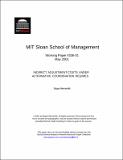Indirect Adjustment-Costs Under Alternative Coordination Regimes
Author(s)
Wernerfelt, Birger
Download4336-01.pdf (118.1Kb)
Metadata
Show full item recordAbstract
The paper is a study of barriers to communication in terms of agents' incentives to search for and communicate complementary information. In particular, I look at the value of commitment by comparing game forms in which a contract is negotiated prior to, versus after, search and communication. I will use the names "firms" and "markets", respectively, for these two game forms. The comparison depends on three effects. (1) The bargaining power effect: Since the decision to communicate reveals information about preferences, it implies a loss of bargaining power when the players negotiate ex post. This hurts the incentives to communicate and therefore the incentives to search. (2) The incentive transfer effect: If the gains from adjustment accrue unevenly, ex ante negotiation may leave one of the players without incentives to communicate and search. With ex post negotiation, that player can bargain for a share of the gains. (3) The bargaining efficiency effect: The negotiation process itself may be more efficient ex post because more information has been revealed. The net effect depends on the magnitude of the gains and their accrual. If negotiation normally leads to agreement, it is better done ex ante in cases where adjustments yield smaller, more evenly accruing gains. When gains are larger and accrue less evenly, ex post negotiation implements more communication and search
Date issued
2003-09-25Series/Report no.
MIT Sloan School of Management Working Paper;4336-01
Keywords
Theory of the firm, coordination, communication
